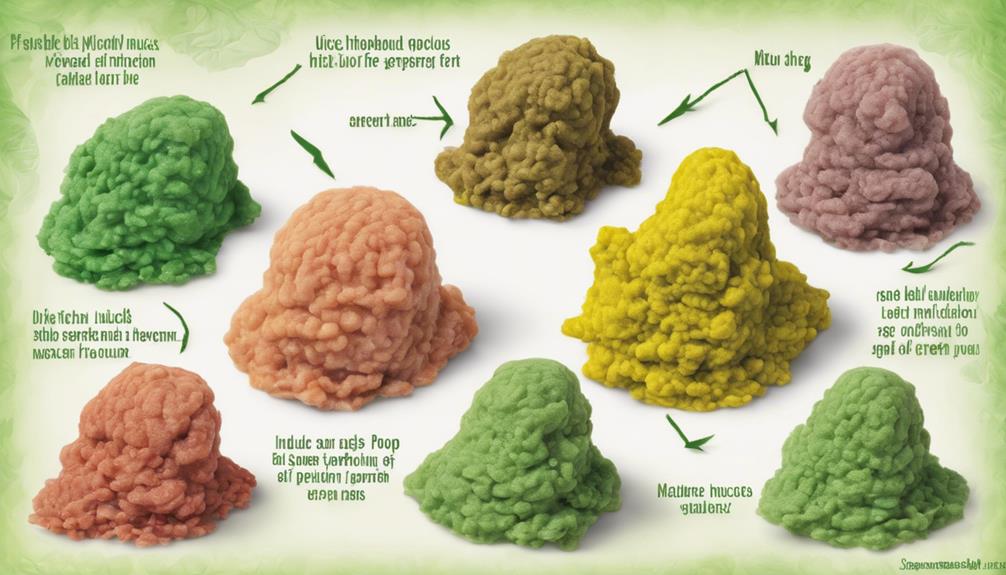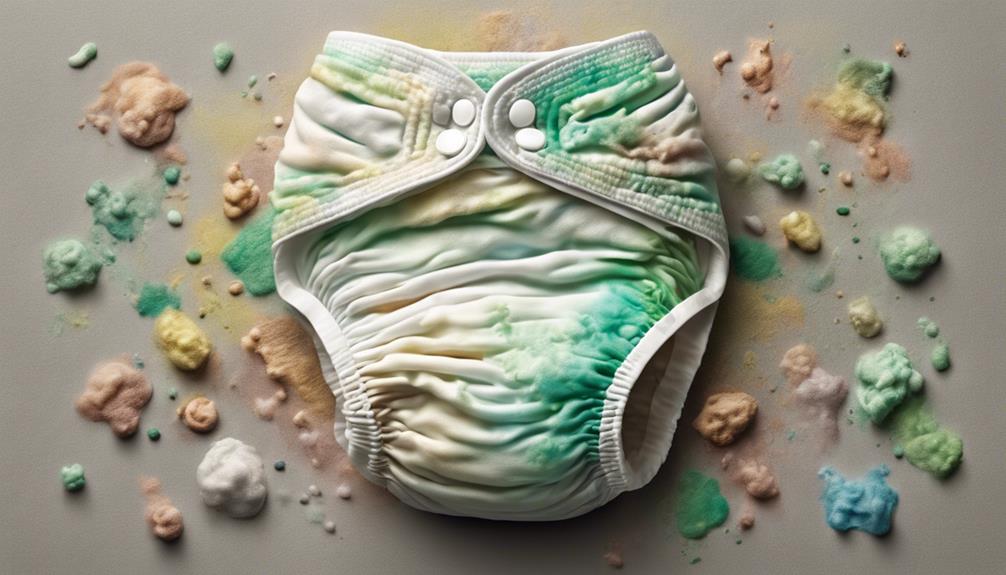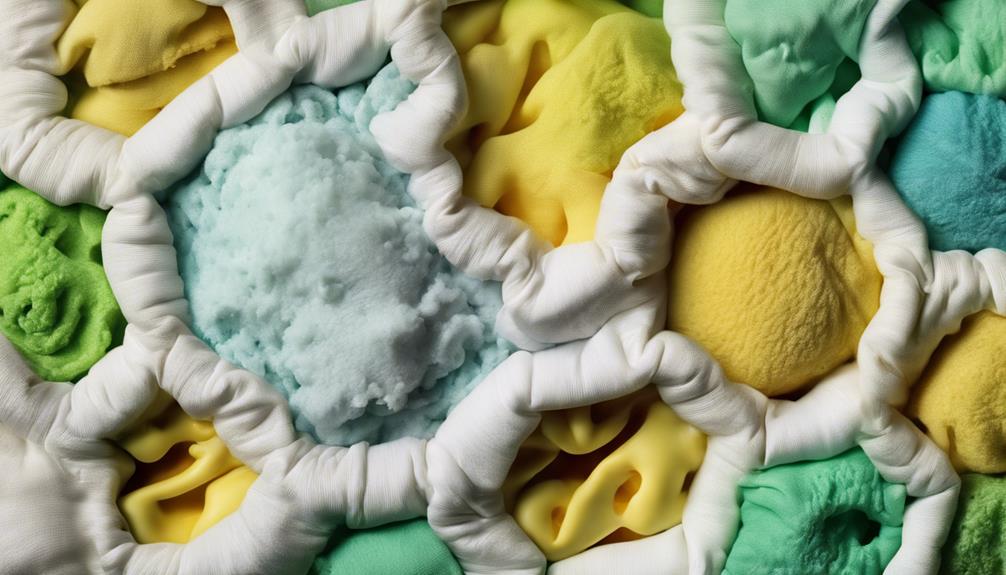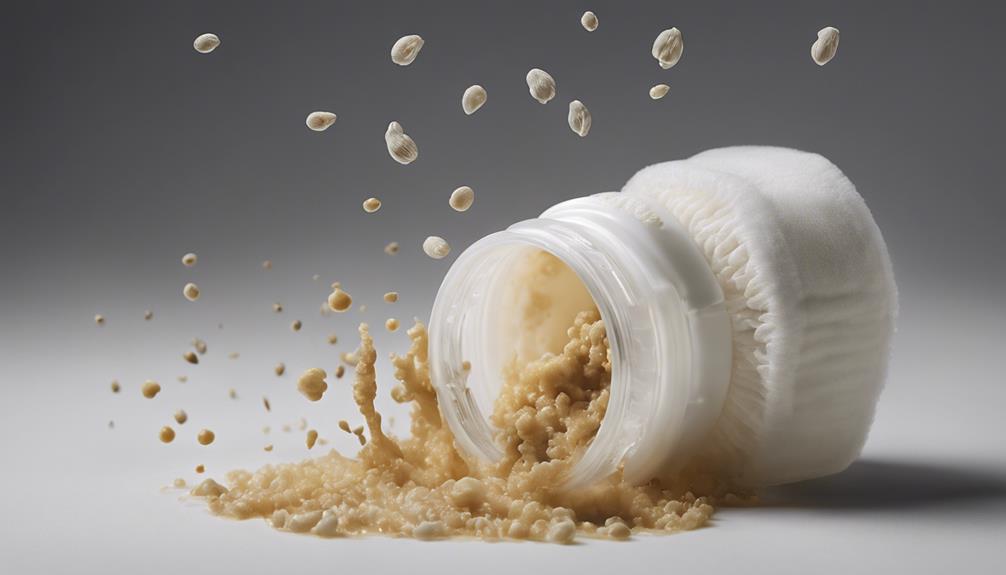As we were changing our newborn's diaper, we noticed something unusual – mucus in the poop. Understanding what this means can be concerning for parents.
Identifying mucus in a newborn's stool is critical for determining their health status, but how do we differentiate between what's normal and when to be alarmed?
Let's explore the signs, causes, and considerations when faced with mucus in a baby's poop to guarantee their well-being and address any potential concerns effectively.
Key Takeaways
- Mucus in newborn poop is normal due to immature digestion.
- Abnormal mucus warrants medical attention for unusual colors.
- Consult a healthcare professional for persistent mucus, weight issues, or blood.
- Monitor poop for mucus, consider allergies, and ensure hydration with pediatrician's guidance.
Common Causes of Mucus in Newborn Poop
When examining the common causes of mucus in newborn poop, it's essential to understand the various factors that can contribute to this phenomenon. In newborns, mucus in the stool can stem from a few primary sources. To begin with, the baby's intestines naturally produce mucus to aid in the digestive process and help with the passage of stool.
Additionally, swallowed amniotic fluid during birth, along with skin cells and mucus present in meconium (the baby's earliest stool), can further contribute to mucus in the poop. Moreover, infections like a stomach virus can also lead to increased mucus production in a baby's stool. Even teething, by triggering excess saliva production, may play a role in the presence of mucus.
Monitoring any changes in the color, consistency, or frequency of mucus in the baby's poop is essential for early detection of potential health issues related to their digestive system.
Signs and Symptoms to Look For

To recognize signs and symptoms of mucus in newborn poop, observe for the presence of a clear, slimy, or jelly-like substance mixed with the baby's stool, giving it a shiny or glistening appearance. Mucus in newborn poop can be a result of various factors such as teething, digestive immaturity, or mild infections. Monitoring any changes in mucus consistency or color is vital in identifying potential issues early on. If you notice persistent mucus in your newborn's poop, it is advisable to consult a healthcare provider for proper evaluation and guidance.
| Signs and Symptoms of Mucus in Newborn Poop |
|---|
| Clear, slimy, or jelly-like appearance |
| Shiny or glistening texture |
| Associated with teething |
| Can indicate digestive immaturity |
| May result from mild infections |
How to Differentiate Normal From Abnormal
Observing color, texture, and consistency changes in a newborn's stool can help differentiate between normal meconium and abnormal mucus present in their poop.
Meconium, the initial stool passed by newborns, is typically greenish-black, tarry, and sticky, representing a shift of amniotic fluid, mucus, and skin cells ingested in the womb. Over the first few days, meconium metamorphoses to lighter, less sticky stools as the baby's digestive system starts functioning.
Changes in color, texture, or consistency that deviate from the usual transformation may indicate abnormal mucus in the stool. While variations can occur, significant deviations from the norm, such as unusual colors or excessive mucus, should prompt seeking medical advice.
Understanding the normal evolution of stool composition from meconium to typical bowel movements can aid in distinguishing between expected changes and those that may warrant further evaluation by a healthcare professional.
When to Consult a Healthcare Professional

Upon noticing persistent mucus in a newborn's poop, it's imperative to consult a healthcare professional promptly.
If your newborn exhibits signs of weight loss or poor weight gain, seeking medical advice is vital to address any underlying issues.
Immediate medical attention is necessary if your newborn appears dehydrated, as this can lead to serious complications.
Additionally, if your newborn experiences severe abdominal pain along with mucus in their stool, consulting a healthcare provider is recommended to evaluate the situation thoroughly.
The presence of blood in your newborn's stool alongside mucus is a concerning sign that warrants a visit to a healthcare professional for further assessment and management.
Any concerning changes in your newborn's bowel habits or the consistent presence of mucus in their poop should prompt you to seek medical attention promptly to ensure their well-being and address any potential health issues effectively.
Tips for Managing Mucus in Baby Poop
When persistent mucus is observed in a newborn's stool, it is important to take proactive steps in managing this issue effectively. Monitoring your baby's poop for slimy or jelly-like mucus can provide valuable insights into their health. If you notice persistent mucus, especially when accompanied by other symptoms, seeking medical advice is essential. Consider the possibility of food allergies and explore dietary changes or elimination diets to address the mucus in your baby's poop. Keeping your baby hydrated and guaranteeing they receive proper nutrition are vital factors in managing mucus in their stool. Consulting a pediatrician for a thorough diagnosis and tailored treatment options is advisable if you have concerns about mucus in your newborn's poop.
| Tips for Managing Mucus in Baby Poop | |
|---|---|
| Monitor baby's poop for mucus | Seek medical advice |
| Consider food allergies | Guarantee proper nutrition |
| Stay hydrated | Consult a pediatrician |
Frequently Asked Questions
What Does Mucus in Newborn Poop Look Like?
We observe mucus in newborn poop as clear, slimy, or jelly-like substances. This can be mixed with the baby's stool, varying in consistency. Monitoring mucus helps us understand the baby's digestive health, important for overall well-being.
How Do I Know if My Newborn Has Mucus?
We notice mucus in newborn poop by observing slimy, jelly-like strands mixed with stool. It can be normal due to their developing digestive system. Excessive mucus signals potential issues. Regular monitoring for changes in consistency or frequency is essential for their well-being.
What Does Mucus in Poop Look Like?
Mucus in poop appears as slimy or jelly-like strands, varying in color from clear to greenish or yellowish. It may be mixed with stool or present as separate strands, resembling strings or coating.
Does Mucus in Baby Poop Mean Milk Allergy?
Yes, mucus in baby poop can signify milk allergy if accompanied by symptoms like fussiness and bloody stool. Inflammation from milk allergy can lead to excess mucus. Consult a healthcare provider for proper diagnosis and guidance.
Conclusion
To summarize, identifying mucus in newborn poop is crucial for evaluating their health. Just as a skilled detective uncovers clues to solve a mystery, parents must carefully observe their baby's stool for any signs of mucus.
By staying vigilant and seeking medical advice when needed, we can navigate through this challenge like a ship sailing through turbulent waters, ensuring the well-being of our little ones.
Stay informed, stay vigilant, and trust your instincts when it comes to your baby's health.









